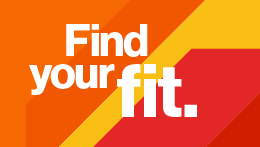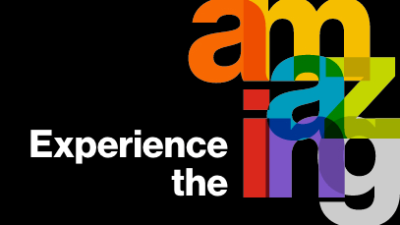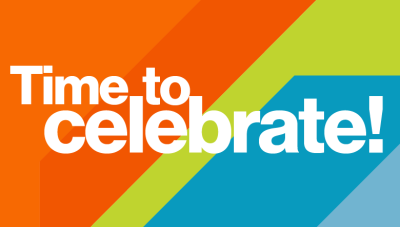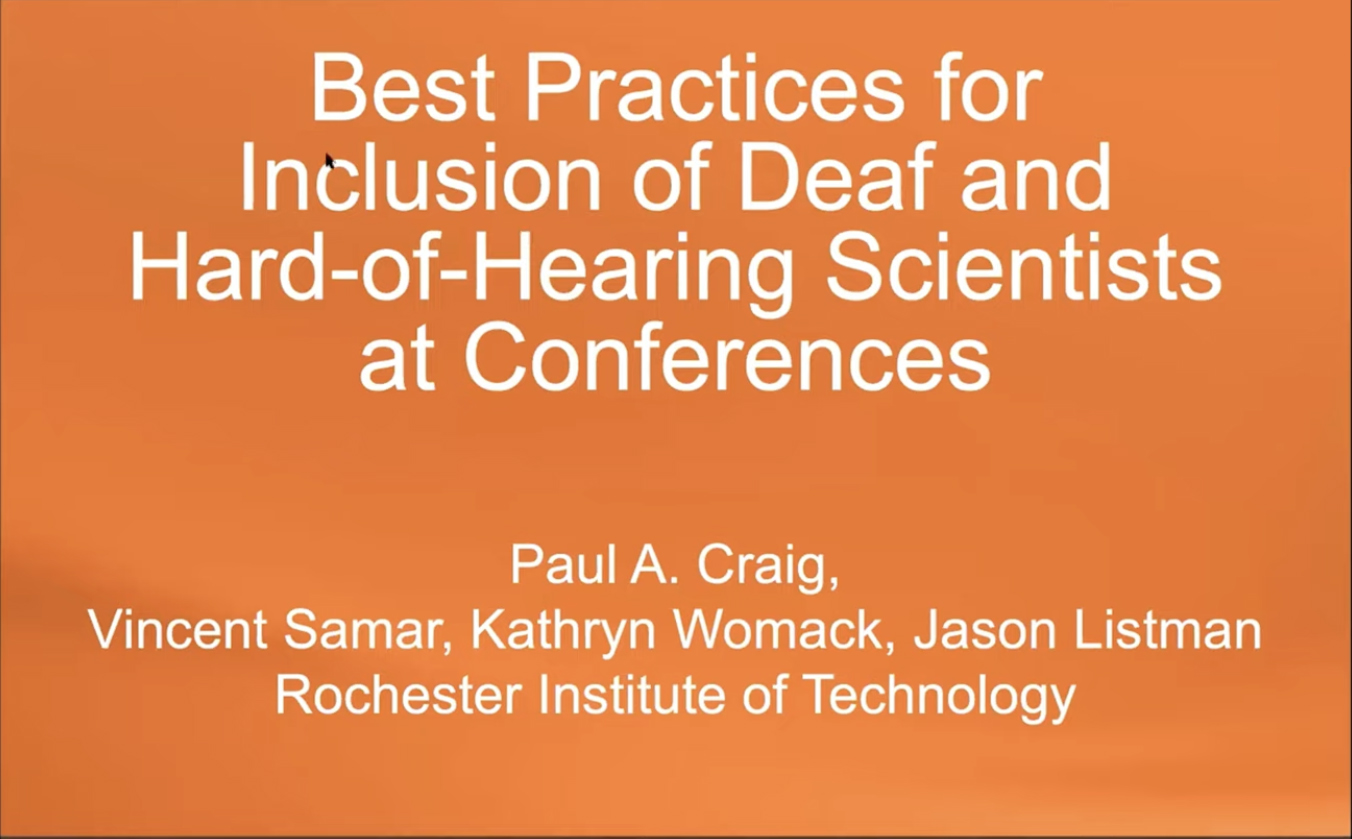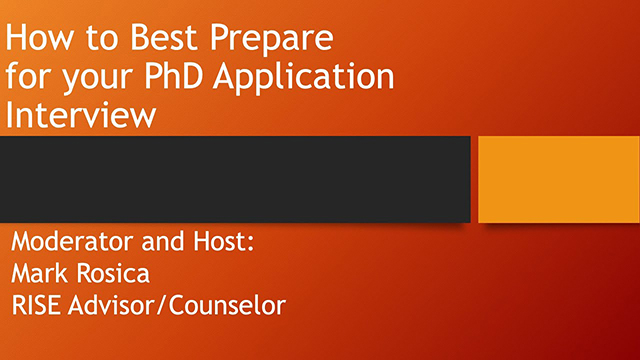RIT U-RISE Resources


Undergraduate
Research Training
Initiative for
Scientific
Enhancement
Breadcrumb
- RIT/
- Undergraduate Research Training Initiative for Student Enhancement RIT U-RISE
RIT U-RISE Resources
Research Resources
Research Employment Information
https://www.rit.edu/ntid/nccc#about-nccc
NCCC assists deaf and hard-of-hearing students, graduating students and alumni with their job search and works with employers to facilitate hiring of highly qualified co-op students and graduates.
General Research Resources
- use these citation resources to help you organize all your references from the start to make your research more efficient and effective
- use this website to search for future graduate school programs
Annual Biomedical Research Conference for Minoritized Scientists
- Web site (http://www.abrcms.org)
- American Society for Biochemistry & Molecular Biology (www.asbmb.org)
- American Chemical Society (www.acs.org)
- American Society for Microbiology (www.asm.org)
- Society for Neuroscience (www.sfn.org)
- Association for Psychological Science (www.psychologicalscience.org)
- American Psychological Association (www.apa.org)
- Society for Behavioral Medicine (www.sbm.org)
- Society for Psychophysiological Research (www.sprweb.org)
- Association for Behavioral and Cognitive Therapies (www.abct.org)
- Google Scholar is a great way to do online research for scholarly articles and filter out unwanted non-scholarly information
- set your library preferences in Google Scholar, click on Libraries in the left hand column and check off RIT or type in RIT so you can access our database articles when using Google Scholar
- request free articles or books if they are not available in the RIT Library
- use this website to find names of journals in your field
- use these databases for literature searches
- check RIT InfoGuides for more databases and other categories (social, psych, etc.)
- learn how to use resources to help you share information about yourself and network with others
- you may email Rebecca Johnson, request a meeting, or IM the Teaching and Learning staff with your questions
- use this website to search for future research mentors
- see who has grants and money in your field of interest!!
- learn quickly how to do online research effectively
- RIT-NTID RISE Program for Undergraduates
NTID-supported students and faculty doing faculty-guided research can have their research posters printed (at no charge) for presentations at professional and academic conferences.
To help with cost, print time, and staffing logistics, please adhere to the following print policies:
- The poster content must be related to NTID-supported student/faculty research.
- Faculty advisors of student researchers must approve the posters for printing. They should submit the final poster for printing on behalf of their student researchers.
- We will not be able to re-print posters, so please carefully proofread contents before sending the file for printing.
- Posters sizes can vary, but please limit posters to no larger than 44” x 60” (44” paper will be the largest that we carry).
- Please avoid using solid color backgrounds or large solid images as backgrounds (this consumes ink very rapidly). However, the use of colored texts, images, graphs, tables, boxes, etc. are encouraged.
- To avoid transposition errors on different computers and printers, please submit the files in PDF format.
- Please plan ahead to allow five (5) business days for printing.
- Faculty-approved PDF files of posters should be sent to Jorge Samper (jbsedr@ntid.rit.edu) for printing.
Please do not hesitate to contact Todd Pagano (tepnts@rit.edu) should you have any questions.
- use this survey for a fast and easier way to develop and do surveys online
Best Practices
Best Practices for Inclusion of Deaf and Hard-of-Hearing Scientists at Conferences
Paul A. Craig, Vincent Samar, Kathryn Womack, Jason Listman
- Best Practices Abstract (pdf)
How to Best Prepare for Your PhD and Your PhD Interview
Mark Rosica
- Access Services for Conferences: For Deaf/Hard-of-Hearing Student Participants
Dr. Paul Craig and Ms. Kat Womack, RISE Core Team Members - Access Services for Conferences: For Conference Organizers
Dr. Paul Craig and Ms. Kat Womack, RISE Core Team Members - All Alone in a Crowd
Dr. Lea Vacca Michel, RISE Mentor - Best Practices for English Instruction for Deaf Undergraduates
Dr. Kirsten Condry and Dr. Pam Connelly, Instructors for RISE-Required Courses
- Accessibility Tips for a Better Zoom/Virtual Meeting Experience
Technology Access Program, Gallaudet University - Checklist for Conference Organisers
International Association of Conference Interpreters - Guidelines for Positioning of Sign Language Interpreters in Conferences, Including Webstreaming
International Association of Conference Interpreters - Resources: National Deaf Center on Postsecondary Outcomes
Developed by experts, covering a variety of topics to support evidence-based practices in postsecondary outcomes for deaf individuals. - Working with Sign Language Interpreters for Events
Vera Institute of Injustice
Mentor Resources
http://workingtogether.deaftec.org/
The Working Together: Deaf & Hearing People online course is an approximately 2-hour course designed to help employers develop the sensitivity and skills to communicate effectively with deaf and hard-of-hearing employees, enable deaf and hearing colleagues to work together more productively, and assist in fostering a workplace culture of diversity and inclusion. The five self-paced modules in the course cover topics on Myths and Definitions, Hearing Loss, Deaf Culture, Communication, and Accommodation and Inclusion in the Workplace. This information can benefit employers, co-workers, HR business leaders, and other inclusion/diversity professionals.
The U-RISE Mentor Training Team is currently developing a series of training modules to orient mentors of deaf and hard-of-hearing scientists to various considerations of access and equity in traditional classroom, virtual classroom, and research lab environments. Check back soon for more!
https://www.rit.edu/ntid/teach2connect
Teach2Connect is intended to provide instructors with classroom teaching strategies that foster collaborative learning among deaf, hard-of-hearing, and hearing students. Additionally, this site provides valuable resources to assist faculty in finding answers to questions they might have when working with deaf and hard-of-hearing students in and outside of the classroom.
Assessment Tools
The DRS was developed by RIT U-RISE based on the National Pre-Doctoral Association's list of core professional and scientific competencies to be used to guide postdoctoral training and was modified for undergraduate trainees. The DRS is used as a formative evaluation measure used to track trainee progress towards development of these competencies:
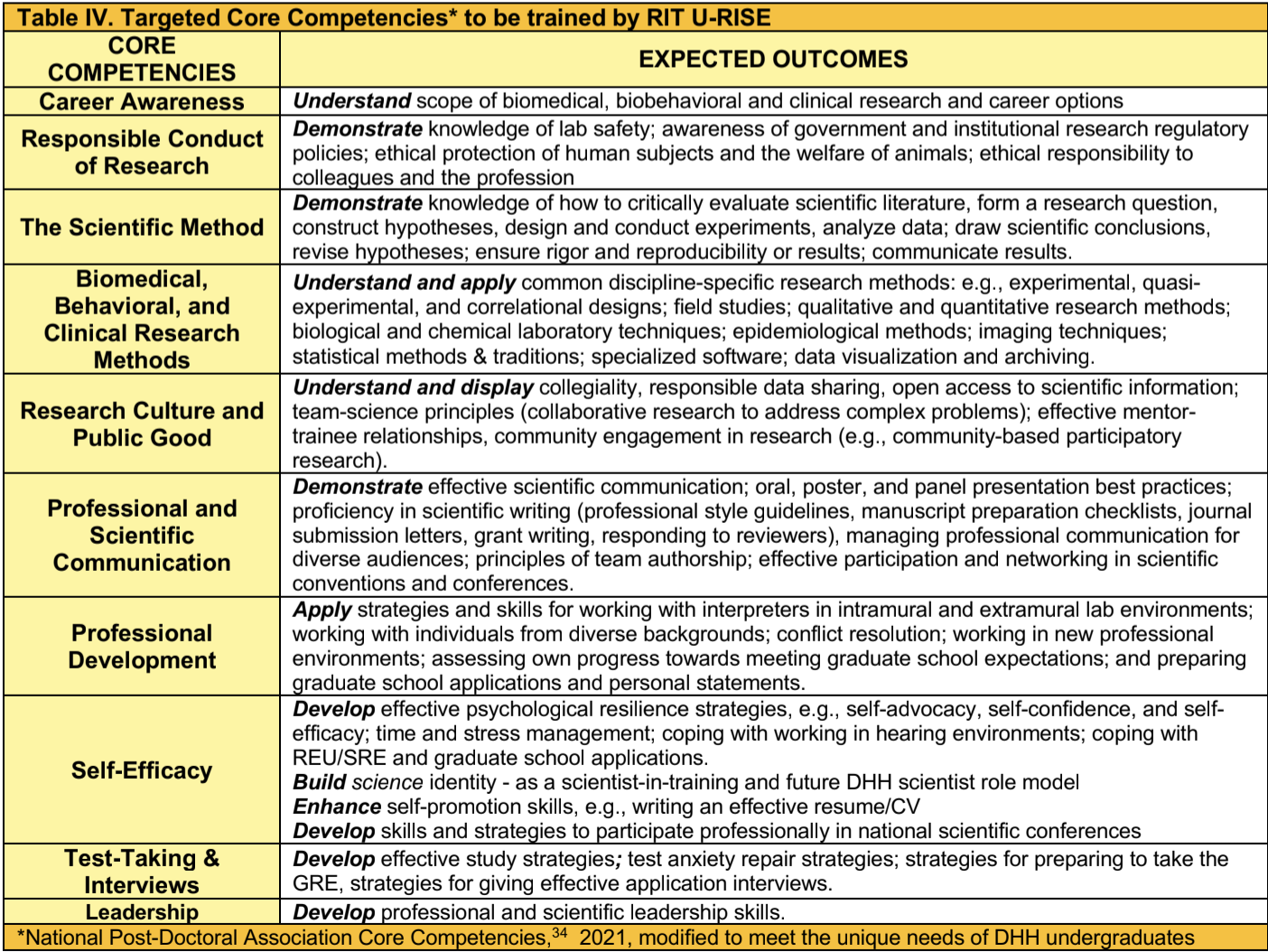
The DRS contains 41 items. Trainees self-rate each item, and each mentor rates their trainee(s) on the same items. The results of the DRS generate a report that informs the development of each Trainee's Individual Development Plan and to stimulate discussion guiding trainees to and through applications to doctoral programs in their final year.
Sample DRS
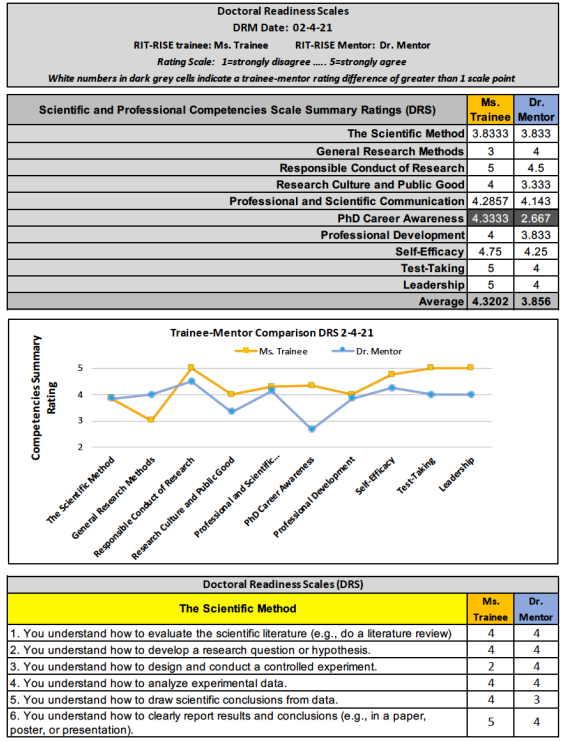
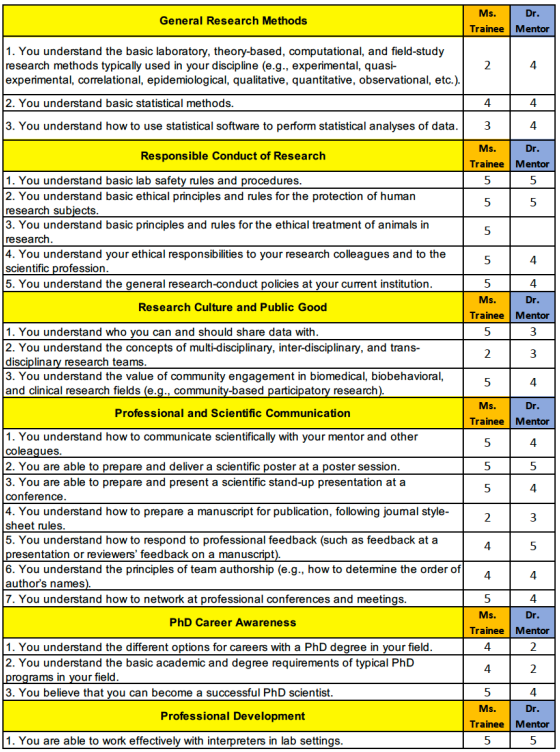
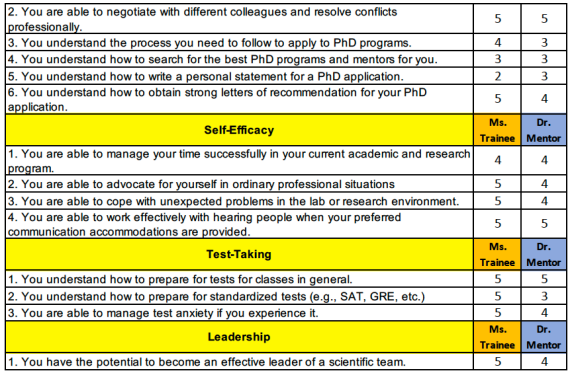
| Table IV. Targeted Core Competencies* to be trained by RIT U-RISE | |
| CORE COMPETENCIES | EXPECTED OUTCOMES |
|---|---|
| Career Awareness | Understand scope of biomedical, biobehavioral and clinical research and career options |
| Responsible Conduct of Research | Demonstrate knowledge of lab safety; awareness of government and institutional research regulatory policies; ethical protection of human subjects and the welfare of animals; ethical responsibility to colleagues and the profession |
| The Scientific Method | Demonstrate knowledge of how to critically evaluate scientific literature, form a research question, construct hypotheses, design and conduct experiments, analyze data; draw scientific conclusions, revise hypotheses; ensure rigor and reproducibility or results; communicate results. |
| Biomedical, Behavioral, and Clinical Research Methods | Understand and apply common discipline-specific research methods: e.g., experimental, quasi- experimental, and correlational designs; field studies; qualitative and quantitative research methods; biological and chemical laboratory techniques; epidemiological methods; imaging techniques; statistical methods & traditions; specialized software; data visualization and archiving. |
| Research Culture and Public Good | Understand and display collegiality, responsible data sharing, open access to scientific information; team-science principles (collaborative research to address complex problems); effective mentor- trainee relationships, community engagement in research (e.g., community-based participatory research). |
| Professional and Scientific Communication | Demonstrate effective scientific communication; oral, poster, and panel presentation best practices; proficiency in scientific writing (professional style guidelines, manuscript preparation checklists, journal submission letters, grant writing, responding to reviewers), managing professional communication for diverse audiences; principles of team authorship; effective participation and networking in scientific conventions and conferences. |
| Professional Development | Apply strategies and skills for working with interpreters in intramural and extramural lab environments; working with individuals from diverse backgrounds; conflict resolution; working in new professional environments; assessing own progress towards meeting graduate school expectations; and preparing graduate school applications and personal statements. |
| Self-Efficacy | Develop effective psychological resilience strategies, e.g., self-advocacy, self-confidence, and self- efficacy; time and stress management; coping with working in hearing environments; coping with REU/SRE and graduate school applications. Build science identity - as a scientist-in-training and future DHH scientist role model Enhance self-promotion skills, e.g., writing an effective resume/CV Develop skills and strategies to participate professionally in national scientific conferences |
| Test-Taking & Interviews | Develop effective study strategies; test anxiety repair strategies; strategies for preparing to take the GRE, strategies for giving effective application interviews. |
| Leadership | Develop professional and scientific leadership skills. |
| *National Post-Doctoral Association Core Competencies, 34 2021, modified to meet the unique needs of DHH undergraduates | |
Sample DRS
Sample DRS shows sample scores on a rating scale of 1 (strongly disagree) to 5 (strongly agree) from a Ms. Trainee and Dr. Mentor for a variety of items related to the ten core competencies. An average score is generated for each competency for both the Trainee and Mentor in a summary chart. A graph comparing Trainee and Mentor scores visually represents the same average summary information.
The CASS were developed by the RIT U-RISE Professional communication and Training Team through evaluation of Trainees in various research environments. The team works collaboratively with trainees and mentors to provide consultation and recommend best-practice strategies, services, and technology to ensure optimized communication access. These scales are used routinely to help determine Trainee communication access needs and preferences in their specific research environments.

Sample CASS
Sample CASS shows sample self-ratings of a variety of communication access preferences on a scale which includes different qualitative rating scales (1: never, rarely, sometimes, often, very often; 2: not important, slightly important, moderately important, very important, extremely important; and 3: strongly disagree, disagree, agree, strongly agree).
For questions regarding research resources you may also contact our librarian, Dr. Joan Naturale, who is happy to help. Please ask questions so that we can assist you.
 Joan Naturale, Ed.D
Joan Naturale, Ed.D
NTID Library Liaison
NTID, Liberal Studies, Deaf Collections, & Deaf Archives Instruction Librarian
RIT, Wallace Center, Bldg 5-1422
90 Lomb Memorial Dr., Rochester, NY 14623-5603
Voice/Videophone: 585.286.4635
Fax: 585.475.2340
Email: jxnwml@rit.edu
I & IM: NTID and Deaf Studies InfoGuides

